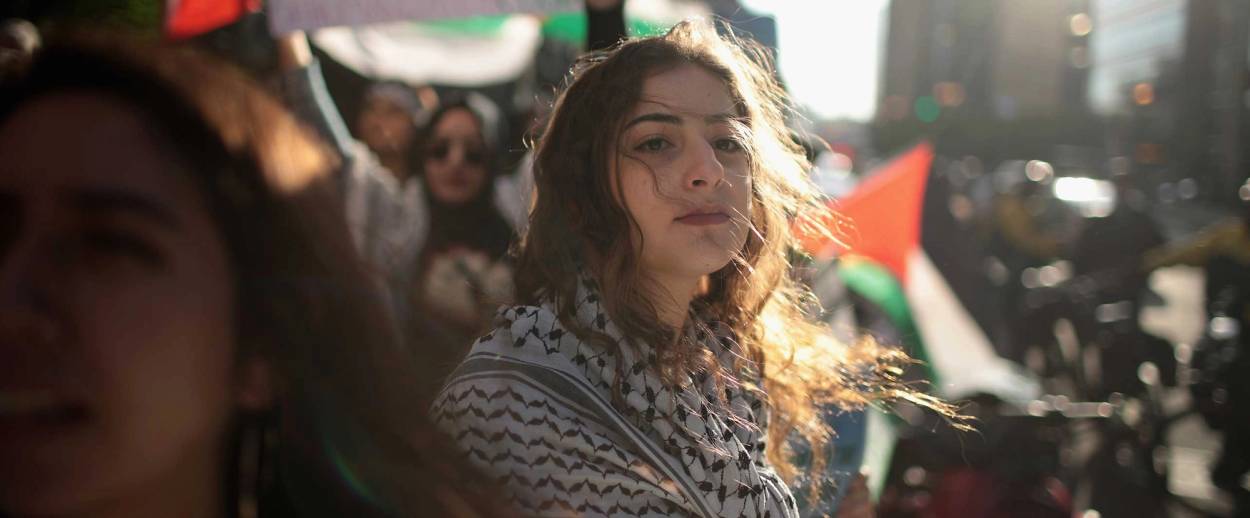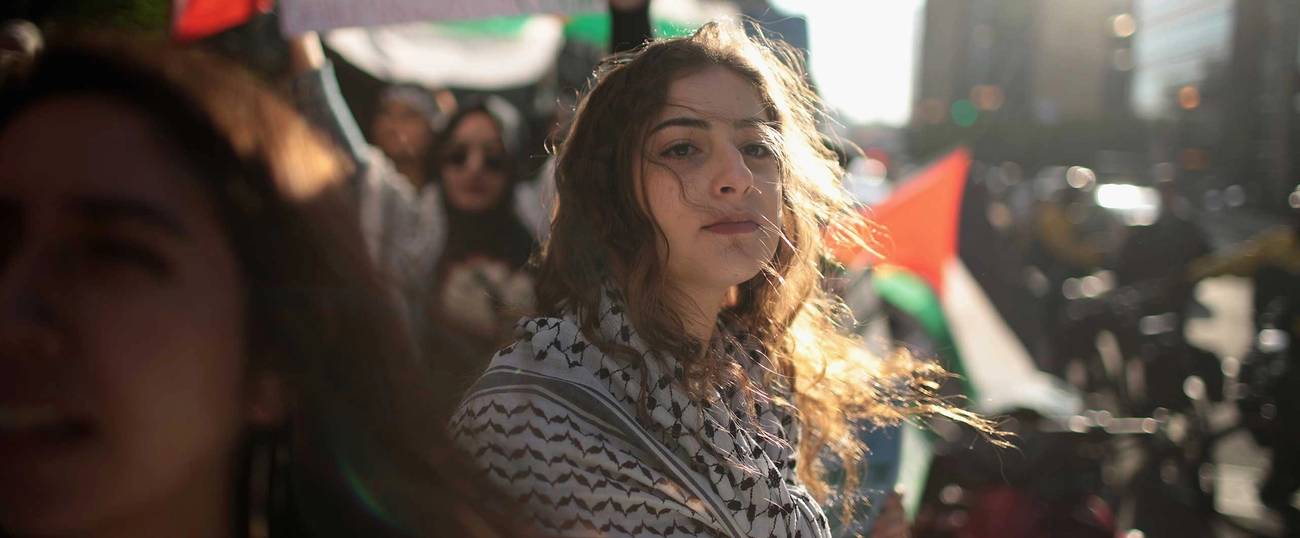How to Talk About Israel and Palestine
Don’t try to save the people on either side of the conflict. Just listen to them.




Recently, I was sitting with a dear friend over coffee. Because I am Jewish, and have written about Zionism, she asked if we could talk about Palestine. She is neither Jewish nor Palestinian; she’s never visited the region and speaks neither Hebrew nor Arabic. Yet she is very passionate about this topic. She wanted to talk about ending the occupation, about human rights and about—in her words—saving Palestine. She pushed some radical solutions, far outside the mainstream of pro-peace groups. When I calmly explained to her that, while I believe in a two-state solution and self-determination for all, after visiting Gaza evacuees in their trailers I would never again support forced dislocation for anyone, and regardless of my views on settlements, didn’t believe that the forced relocation of half a million people would lead to peace, she was stunned and furious. I listened to her for a while, because I value her opinion and her voice. Then, I asked her a question: Had she ever actually met an Israeli? Had she ever met a Palestinian? Embarrassed she replied, no, not once.
I felt some tough love was in order. “Has it occurred to you,” I asked her, “that the way you are talking about a place you’ve never been to and about people you have never met constitutes white saviorism and colonialist thinking?”
My friend was stunned, and taken aback. As a professional justice advocate, she thought she had unlearned this type of behavior. She was angry: at herself, at me, at how pervasive this type of Western thinking, trying to offer far-reaching solutions even without knowing much about the problem, truly is. I understood, because I have had this conversation many, many times with many, many people. Having worked in social justice for more than a decade, I know that even the best-intentioned among us have their own inner Rudyard Kipling eager to swoop in and save the helpless natives from themselves. It takes time and mindfulness to realize that as good as our activism might make us feel, we’re here in a supporting, not starring role, and that we must take our cues from those on the ground who are living with conflict every day. And nowhere, perhaps, does this lesson need to be learned more urgently than when it comes to Israel-Palestine advocacy.
How, then, should you talk about Israel and Palestine? Here are a few tips to keep in mind, beginning with three things you shouldn’t do.
First, the Palestinians are not helpless people who need to be rescued. In truth, they are fighting not only against Israel’s policies, but also against brutal, violent, authoritarian leaders of their own in both Gaza and the West Bank. They are struggling to survive the impact of the Israeli conflict on their economy, their physical and mental health, and their lives, but they have agencies and form complex alliances and hold diverse opinions and don’t need some American academic, well meaning as she may be, to swoop in and save them from themselves.
Second, Israel is a place, not a parable. It’s not a cartoon. It is neither a perfectly good nation nor an evil entity. It’s a country full of real people and their philosophies, politics, religious beliefs, ethnic backgrounds, and corresponding frictions. It is also a place that was devastated by colonialism. Rome sought to erase Jews from the Middle East because they refused to obey a foreign imperialist power. The people of Judea fought to keep their land and eventually lost. The Romans named it Palestine, and gave way to wave after wave of foreign imperialist occupations. The Israeli-Palestinian conflict, and all of its hardship, trauma, and bloodshed, demonstrates the long-term effects of the violence of colonialism and why we must fight its influence always, but especially when navigating post-colonial countries that are trying to rebuild. This is what colonialism and imperialism do—create generations of heartache and bloodshed.
Third, diaspora communities affected by the conflict are also real people, with real feelings, history, and family involved. They don’t owe you their thoughts or feelings on a deeply personal and painful subject on demand to be dissected and debated by colleagues, friends, and acquaintances with no skin in the game. Attempting to kick Jews out of progressive spaces because of their Zionism and support for Israel, which many view as intrinsic to their identity, does not bring justice to Palestinians or better their lives. Instead, it entrenches the conflict, drives diaspora Jews to the right, and makes real peace-building conversations more difficult to have. Muslim-Jewish relations and global Palestinian-Jewish relations are too often inflamed by saviorist, colonialist rhetoric which anoints one true narrative over the many tangled stories that make up the region. You must be either pro-Israel or pro-Palestine, and once you pick a side, you must prove your fevered devotion by never allowing for dialogue, nuance or any chance at peace. This happens because this zero-sum dynamic is not actually about Israel or Palestine or the region at all: It is about our own need for edification and glory. This is why so many armchair combatants in this conflict, left and right, feel comfortable offering up radical solutions from a safe distance of thousands of miles. This needs to stop.
Now, then, for the positive side. It is entirely possible to be an advocate for Israel and for Palestinians without engaging in colonialist or saviorist behavior. First, listen to the voices on the ground and come to their aid when asked, even if the ask doesn’t fit some overall grand narrative you have in your head. Where, for example, was the movement for Palestinian rights when protesters were being beaten and arrested by Hamas? Where were they when Palestinian journalists were being tortured by their own government? Where is the criticism of the Palestinian Authority refusing to pay for electricity for Gaza’s residents and cutting salaries in Gaza? And where is the lauded and wildly effective pro-Israel movement when Israelis cry out against corruption, police brutality, and religious extremism in their own government? If we are advocates for Israel, for Palestine, or for both, we should listen to the voices on the ground and stand with them. We shouldn’t shut our eyes to the failures, abuses, and bad policies of any governing body because it doesn’t fit our narrative.
Second, interrogate your biases and ask if you are truly acting in the best interest of those directly affected or merely pushing an existing worldview on a volatile conflict. Our own biases can lead us to feel a closeness to various parts of the conflict. Some racial justice groups have expressed a feeling of kinship to the Palestinian cause. Some religious Christian groups express an affinity and a feeling of closeness with Israel. While building bridges with others is laudable, we should all be circumspect about tying affinity to affectedness.
Most importantly, however, we must understand where the region is and respect that. We cannot demand peace simply because we want it to come. Americans have been demanding peace—our own particular versions of it—from the region for some time. There are no political leaders with the ability to deliver on a deal at this moment. Not on any side of the conflict. We must accept that reality, because this conflict isn’t about us. Once that is internalized American activists can look for fruitful ways to support building the conditions that could make peace politically feasible. Pushing for peace on our timetable, without the right conditions, will lead to more bloodshed. Failed negotiations have often led to spikes in violence and loss of life. We must focus on harm reduction, deescalation, and economic stability while aiding in long-term peace-building efforts on both a grassroots and government level.
Ultimately, it comes down to one very simple rule: Israelis and Palestinians need to solve the conflict. It is not for the American activist to decide for them what the correct outcome should be. We can support, mediate and deescalate—but we cannot rescue. It never works.
If we can keep this in mind, we may be able to do some good.
***
Like this article? Sign up for our Daily Digest to get Tablet magazine’s new content in your inbox each morning.
Carly Pildis is the Director of Grassroots Organizing for the Jewish Democratic Council of America, and an advocacy professional based in Washington, D.C. Her Twitter feed is @carlypildis, and her website is www.carlypildis.com.